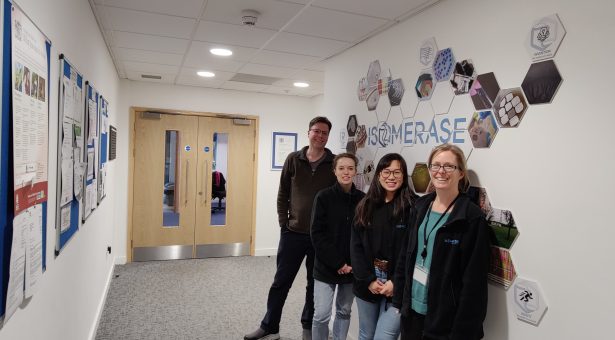Ho Yu Liu reflects on her experience at biotech business, Isomerase

Ho Yu Liu, PhD student based at the Quadram Institute, recently returned from her PIPS at Isomerase, a biotechnology research organisation in Cambridge.
Ho Yu said,
“I decided a placement in industry would be most beneficial to me as I had no experience in this area. I felt getting industry experience would give me a different perspective and be helpful when deciding what to do when I finish my PhD.
I chose Isomerase, an innovation partner helping companies to use microbes to make anything from therapeutics to enzymes, agricultural and consumer products; sustainably, cost effectively and at scale.
I worked on a project looking at extremophiles, organisms that can live in extreme environments such as with radiation, salinity, extreme temperatures or pHs.
I found the first week or so of my placement the most challenging as everything was new, and as I was beginning a new internal company project, it was up to me to decide where, and how to start.
As part of my placement, I worked on growing some of these extremophile microbes. Figuring out the media, the temperature and conditions for the extremophiles was a challenge, as I typically work with microbes such as Salmonella and E. coli which are more commonly used in research and have less complicated growing conditions. It was satisfying when I figured out what media and conditions the extremophiles needed to grow.
After growing the extremophiles, DNA extractions started. Normally, I use a kit to extract DNA which contains all the chemicals, components, and steps follow but you can’t see the DNA you’re extracting. On my placement I used a different protocol where you get to see the DNA and spool it out, which was quite cool. I ended up having to optimise the protocol for the extremophiles and increase the amount of bacterial culture used to get enough high molecular weight DNA to be able to sequence the DNA.
Along with learning new techniques and how to work with challenging bacteria, the placement was an experience that’s helped me with resilience. Going forwards in my PhD when things go wrong (as they often do in science), I have more perspective.
Working in a company gave me a bigger picture of science too: it helps to know how some of the research I’m doing might benefit our society outside of academia.
I enjoyed getting to know how a company works, which is very different to academia.
For example, at QIB, we have a common online lab book system for recording experiments, but people can record experiments in different ways. While I was on placement, there was a more standardised template for recording experiments.
I learnt lots of soft skills on placement and networked with colleagues. Besides working alongside a couple of scientists, I had weekly catchups with the Chief Scientific Officer, one of the company founders. It was interesting and insightful to have meetings at a senior level.
Overall, I enjoyed being at Isomerase. I got valuable insight into different options of what you can do after a PhD and found it refreshing to go to a different place and have a break from my research project.
Often you can think that there is just one career path, undergraduate to PhD to Postdoctoral Researcher to Group Leader, but there are many career paths out there.
I’m still not sure what I want to do after my PhD, but the PIPs experience has helped understand the options available. I like the freedom with research in academia but there are aspects of working in industry that appeal to me too.
In my opinion, PIPS are less about learning in terms of studying, but more about learning in terms of life.
My advice to PhD students choosing a PIPS is do something you want to do. Maybe think less about the physical skills you will gain and more about what the experience will bring to you and how it can help you develop more holistically in your career.”
